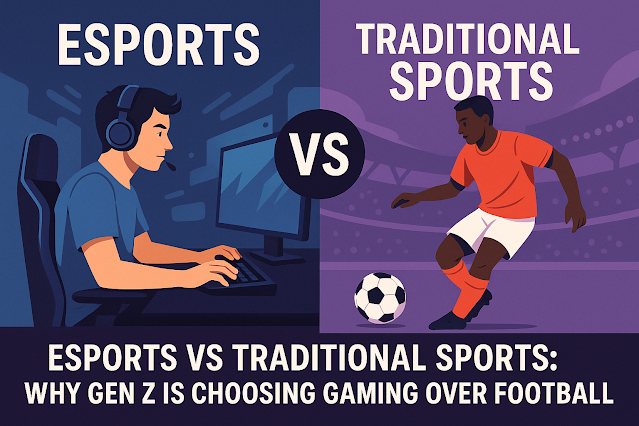Over the past few years, esports has transformed from a small-scale pastime to a billion-dollar business that competes with — and sometimes outperforms — conventional sports. Although soccer, basketball, and cricket have drawn worldwide viewers, Generation Z is demonstrating a significant change in taste: picking video games over live sporting events.
The Rise of Esports
Esports — competitive video gaming — has exploded in popularity thanks to platforms like Twitch, YouTube Gaming, and Facebook Gaming. Games like Valorant, Fortnite, Call of Duty, League of Legends, and PUBG Mobile have become household names. Esports tournaments now fill stadiums, offer million-dollar prize pools, and attract millions of online viewers.
Events like the League of Legends World Championship, The International (Dota 2), and Fortnite World Cup pull viewership numbers comparable to — and sometimes higher than — major sports events.
According to Statista, the global esports market revenue was valued at over $1.6 billion in 2024 and continues to grow at an unprecedented rate.
Why Gen Z Prefers Gaming Over Traditional Sports
1. Accessibility & Inclusivity
Traditional sports often require physical space, team coordination, expensive equipment, and training. In contrast, gaming only needs a smartphone or a PC and a stable internet connection. That’s why it's exploding in countries like India, Brazil, and Southeast Asia, where access to traditional sports facilities may be limited.
Anyone can be a gamer, regardless of gender, location, or physical ability.
2. Real-Time Engagement
Watching a football match on TV is a passive experience. But watching a streamer play GTA 5 RP or Call of Duty Warzone is interactive. Viewers can chat live, donate, request songs, or even influence gameplay in real time.
This two-way communication makes gaming far more engaging than traditional sports.
3. Personal Branding & Creatorship
Gamers and streamers are more than just players — they are content creators. Platforms like Twitch and YouTube allow gamers to build personal brands. Names like Ninja, Mortal, TenZ, Pokimane, Scout, and CarryMinati are known globally, not just for their gaming skills, but for their personalities and content.
This creator economy appeals directly to Gen Z, who value authenticity and relatability over polished sports stars.
Esports Careers: More Than Just Playing
Esports is not just about becoming a pro gamer. It offers diverse career options:
Shoutcasters (Commentators)
Analysts and Coaches
Content Creators
Esports Journalists
Event Managers
Game Developers and Designers
This ecosystem creates opportunities for millions — a significant reason why young people are investing time and energy into gaming seriously.
Esports in Education
Believe it or not, colleges and universities now offer esports scholarships. Institutions in the US, South Korea, and even India have started to recognize the value of esports. Students can now pursue degrees in esports management, game design, and streaming production.
This educational backing has added legitimacy to gaming as a career path.
Impact on Mental Skills
Contrary to myths, gaming isn’t a brainless hobby. Competitive gaming improves:
Hand-eye coordination
Strategic thinking
Decision-making under pressure
Teamwork and communication
Games like Valorant and CS2 require high-level team coordination, map control, and game sense — very similar to traditional sports strategy.
Are Traditional Sports Dying?
No, but they're evolving.
Traditional sports still hold immense cultural and emotional value. However, to stay relevant, they are beginning to merge with esports and digital content. For example:
The FIFAe World Cup brings together football fans and gamers.
NBA 2K League combines basketball with gaming.
Football clubs like Manchester City and PSG have their own esports teams.
This crossover trend is only going to increase.
The Future: Metaverse & VR Gaming
The future of gaming lies in the metaverse and VR esports. Platforms like Roblox, Rec Room, and Meta’s Horizon Worlds are laying the groundwork. Soon, gaming tournaments will be held in fully immersive VR worlds, where players and spectators will interact in real time from anywhere on the planet.
Final Thoughts
Esports is no longer a subculture. It’s mainstream. For Gen Z, it's not just entertainment — it’s identity, community, career, and even education. As esports continues to evolve, the gap between gaming and traditional sports will continue to shrink.
In a world where connection, innovation, and digital interaction matter more
than ever, esports is winning — not just the games, but the hearts of the next generation.
























0 Comments:
Post a Comment